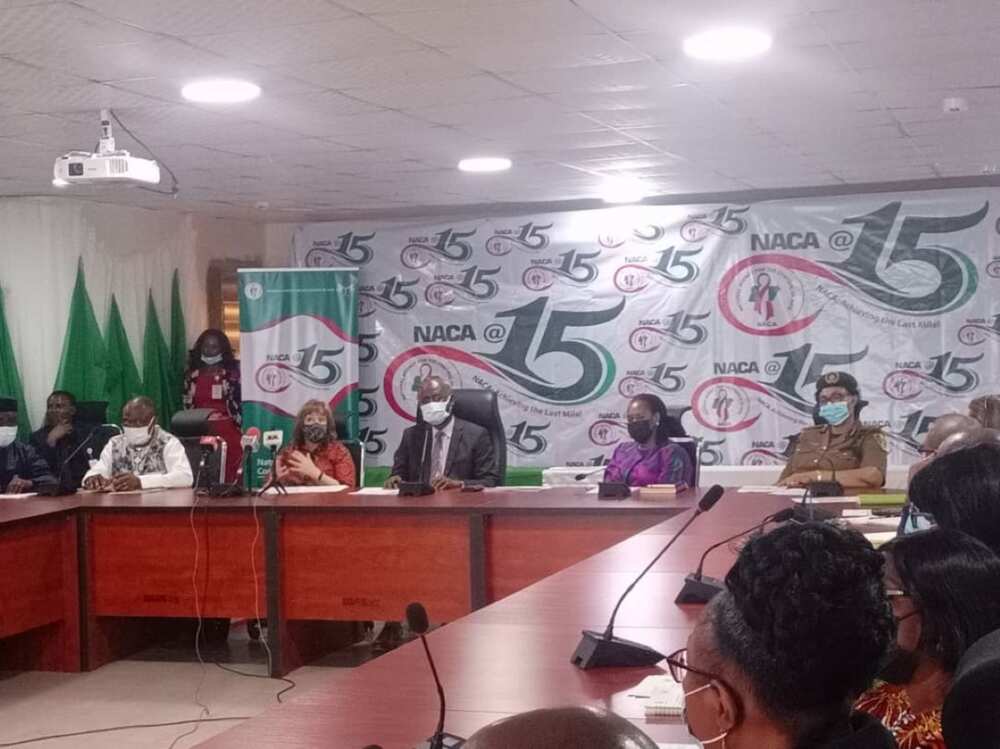HIV/AIDS: NACA Not Disappointing Nigeria in This Fight, UN Boasts
- The Nigerian government has been commended for their efforts in the prevention of new HIV transmission in the country
- The commendation was given to Nigeria by the country director of the United Nations Joint Programme on HIV/AIDS (UNAIDS) Erasmus Morah
- Also, the minister of health called on every stakeholders to ensure that all hands must be on deck to eliminate mother-to-child transmission of HIV
The United Nations Joint Programme on HIV/AIDS (UNAIDS) on Tuesday, February 22, commended the National Agency for the Control of AIDS (NACA) for championing the prevention of new HIV transmissions drive in Nigeria.
Erasmus Morah, the country director for UNAIDS said NACA, the agency responsible for the coordination of HIV activities including facilitating the development and management of the policies and strategies in all sectors, is not disappointing Nigeria.

Source: Facebook
Speaking at the presentation of the stewardship of HIV Response in Nigeria 2007-2022, Erasmus said NACA is alive to its responsibilities.
The presentation was made by the Secretary to the Government of the Federation, Boss Mustapha.
PAY ATTENTION: Subscribe to Digital Talk newsletter to receive must-know business stories and succeed BIG!
He also said that the agency has over the years shown its capability by not just managing funds made available for the fight against HIV but also secured enough confidence globally to ensure the disease is fought to a standstill.
Also speaking, Mustapha said with NACA's commitment and the level of successes recorded in HIV response shows that with proper collaborations, Nigeria can achieve more.
The SGF also urged state governments across the country not to remain docile in this fight but to take up their responsibilities to ensure the sustainability of the framework to achieve this.
Mustapha said:
“While congratulating NACA for its achievements in the national HIV response coordination, I must emphasize the importance of partnerships as well as the harmonisation of programmes for greater impact.

Read also
This is good: President Buhari welcomes Nigeria’s designation as vaccine-manufacturing base
”It is in this regard that I call on state governments to take their rightful place in this partnership as we develop a sustainability framework for the national response.”
Continuing, Mustapha said that the government at the federal level acknowledges the contributions of every development partner, especially the US President’s Emergency Program for AIDS Relief (PEPFAR) and the Global Fund to Fight AIDS, Tuberculosis, and Malaria (GF-ATM) and the United Nations systems.
His words:
"We look forward to a sustained partnership with shared responsibility in the last mile for ending AIDS by the year 2030."
In his address, the minister of health, Osagie Ehanire, said that there have been significant efforts made by NACA through its activities in the response to HIV/AIDS in Nigeria.
Commending the agency for its successes, Ehanire said all hands must be on deck to ensure that Nigerian ends mother-to-child transmission of HIV.
The minister said:
"That is the priority on our agenda as we push for the last mile of the epidemic control. I look forward to joining forces with you all to strengthen the program for the benefit of our great country."
NACA DG makes his remarks
The director-general of NACA, Aliyu Gambo, who made a presentation on the achievements of the agency from its inception in 2016 to 2022, said that February 22 of every year provides an opportunity for reflection on the successes of the national response.
He also said the day also provides an opportunity for the agency and the country at large to celebrate all communities, partners, and stakeholders for the milestones achieved and renew commitments to end AIDS by 2030.
Gambo added that Nigeria was on the verge of achieving UNAID’S programmatic indicators for epidemic control due to tremendous growth in our programs over the last 6 years.
he said:
“This year we expect tremendous growth in our program for prevention of mother-to-child transmission of HIV (PMTCT) as we take key steps towards ensuring that no child is born HIV positive in Nigeria.
"Our strategies in programme alignment by all stakeholders, service integration at community levels and strong political support at all levels made our national response the most Covid-19 resilient in the world with the highest yield at the peak of the COVID-19 pandemic."
He also said that there is the need to end all forms of inequality, leave no one behind as well as ensure inclusive implementation of our programs at community levels.
HIV/AIDS: UN highlights 1 most important thing that can end spread of disease
As the fight against the spread of HIV/AIDS continues globally, Nigeria has been urged to do all it takes to end inequality among persons living with the virus.
The call was made by the country director of the Joint United Nations Programme on HIV/AIDS (UNAIDS), Erasmus Morah.
Morah said Nigeria must not rest its oars in the effort to prevent the transmission of HIV from mothers to their newborns.
Statistics of babies born HIV positive in Nigeria
Meanwhile, Legit.ng previously reported that a report from the National AIDS and STIs Control Programme showed that 490 babies tested positive for HIV in 2020.
Details of the report showed that in 2020; 27,909 infant DNA samples were tested, 19,715 were tested and 409 babies' results came out positive and in 2019; 26,247 infant DNA samples were collected, 19,947 were tested and 833 were positive.
It was also gathered that a large number of these babies contracted the virus mostly because their mothers failed to access facilities for antenatal care and ended up either delivering at home or other birthing locations.
Source: Legit.ng




